Latest News
22 March 2023
The Protein Transition: unchaining a revolution

With pioneering patents, leading start-ups, strong scientific research and the presence of industrial giants like DSM, the Netherlands has everything it needs to lead a revolution in the field of meat substitutes and cultured meat. Unfortunately, the legislation relating to these products is slowing things down and promising start-ups are moving abroad. Is our country at risk of falling behind?
15 March 2023
Stan Brouns appointed as professor

The Executive Board has appointed Stan Brouns as full professor of Molecular Microbiology at the department of Bionanoscience as of 7 February 2023. His work focuses on how microbes defend themselves from viruses. Brouns: “Bacteria have had a few billion years of evolution to come up with all sorts of clever ways to defend themselves from viruses. We aim to uncover what they have evolved over all this time.”
08 March 2023
Open Education Ambassador Award for Timon Idema
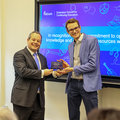
On 7 March, in the occasion of Open Education Week 2023, Timon Idema received an Open Education Ambassador Award. Along with seven other TU Delft lecturers, Idema was offered the award in recognition of his commitment to openly share knowledge and educational resources with the world.
07 March 2023
Stan Brouns wins Ammodo Science Award
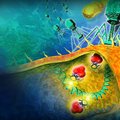
Professor of Molecular Microbiology Stan Brouns is one of the eight laureates of the Ammodo Science Award for fundamental research 2023. Brouns will receive a cash prize of 350,000 euros. In the coming years, he can use this prize to explore new avenues of fundamental research on the battle between bacteria and viruses.
03 March 2023
TU Delft scientists reveal molecular structure of bacterial gas vesicles
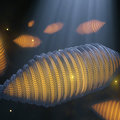
Similar in function to ballast tanks in submarines or fish bladders, many water-based bacteria use gas vesicles to regulate their floatability. In a publication in Cell, scientists from TU Delft now describe the molecular structure of these vesicles for the first time. These gas vesicles were also recently repurposed as contrast agents for ultrasound imaging.
02 March 2023
Accreditation for new Master’s Degree in Quantum Information Science & Technology
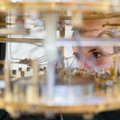
On 16 February the Netherlands-Flemish Accreditation Organisation (NVAO) accredited the Master's degree in Quantum Information Science & Technology (QIST). With this accreditation, the new programme can officially kick off in September 2023. The Master’s programme is a collaboration between TU Delft (AS, EEMCS and QuTech) and Leiden University.
28 February 2023
TU Delft presents the eight best Climate Action & Energy Papers

Record temperatures, floodings and melting sea ice: radical weather events are becoming more frequent and have a devastating effect on our planet and our lives. By accelerating the energy transition and climate action TU Delft, together with its partners, tries to prevent climate change and contain its consequences. With the election of the Best Climate & Energy Paper, TU Delft is highlighting a number of large and small innovations that contribute to this.
23 February 2023
Vici for Valeria Garbin, Simon Gröblacher and Atsushi Urakawa

The Dutch Research Council (NWO) has awarded Delft researchers Valeria Garbin, Simon Gröblacher and Atsushi Urakawa a Vici grant of up to 1.5 million euros. This will enable the laureates to develop an innovative line of research and further expand their own research group for a period of five years. Vici is one of the largest personal scientific grants in the Netherlands and is aimed at advanced researchers.
20 February 2023
Advanced microscopy to understand life and fight disease
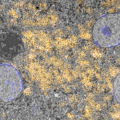
On 20 February, NL-BioImaging (NL-BI) received national funding of 25 million euro, of which 15 million by NWO. The funding supports the consortium in becoming the national advanced light microscopy infrastructure providing coordinated access to the Netherlands’ best imaging technology and analysis platforms. NL-BI is a multi-sited collaboration of all 18 Dutch universities, medical academic centres and research institutes.
20 February 2023
Creating chaos in battery to extend lifetime
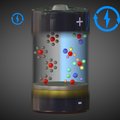
The electric car has made its entrance thanks to the advancement of batteries, and we need batteries to store renewable solar and wind energy until the moment when we need the energy. Currently, the most widely used battery for this purpose is the lithium-ion battery. Researchers from TU Delft now present a new breakthrough in Nature Communications and Advanced Materials that could further improve the life of these batteries.